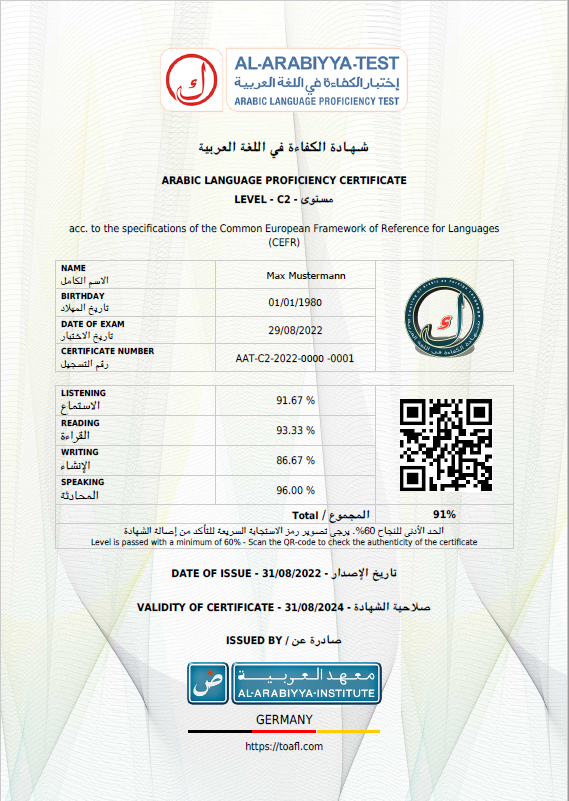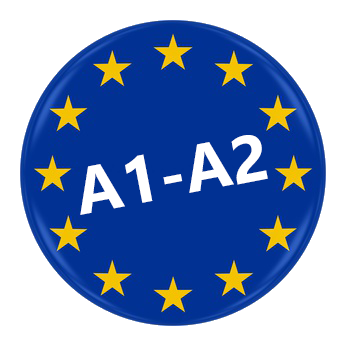Al-Arabiyya-Test

among others recognized here:
Get an Arabic certificate in the levels A1 – C2 (CEFR). The structure and content of the Arabic language proficiency tests are based on more than 40 years of experience in Arabic testing according to UNICERT and CEFR standards. The AL-ARABIYYA-TEST is designed and conducted by the AL-ARABIYYA-INSTITUTE and proves your competence in Arabic.
The AL-ARABIYYA TEST is a fully computer-based Arabic language proficiency test developed by Eckehard Schulz, Professor at the Oriental Institute of the University of Leipzig.
The development of the uniform framework for the AL-ARABIYYA-TEST according to the specifications of the Common European Framework of Reference for Languages (CEFR) was based on this very long experience. The efforts to make it computer-based and to benefit from the new technical options started in 2006 and lasted more than 5 years. Many academic professionals mainly from the Oriental Institute of the University of Leipzig participated in this process. The design of the test and the questions are also based on the results of more than 35.000 tests done by students in Germany and many other countries all over the world.
AL-ARABIYYA-TEST
BASIC
Listening, Reading, Writing
-
A1 - B2 CEFR
-
Listening
-
Dialect
-
Reading
-
Writing
-
Speaking
-
Online 24/7
-
Certificate as PDF by e-mail
AL-ARABIYYA-TEST
PRO
Listening, Reading, Writing, Speaking
-
A1 - C2 CEFR
-
Listening
-
Dialect*
-
Reading
-
Writing
-
Speaking*
-
Online with appointment
-
Certificate as PDF by e-mail
- Setup & Timing
- Task-types
- Requirements
- Exam Regulations
Older requirements based on paper tests recommend more time. Computer based tests are much closer to reality of language reception and production, more effective and less time-consuming to take as opposed to paper tests. The person to be examined has only a certain amount of time available for each task. This reduces the time required compared to traditional paper tests. It has been shown empirically that the below defined period of time and amount of tasks leads to the expected results.
| Skills | Tasks | Schedule |
| Listening | 3 | 30 minutes |
| Reading | 3 | 30 minutes |
| Writing | 3 | 40 minutes |
| Speaking* | 3 | 20 minutes |
| Total | 12 | 120 minutes |
*Since Modern Standard Arabic is not spoken in everyday life, dialect-related audios or videos from the above mentioned dialects will be included. The test taker is obliged to choose the favored dialect. It is only used as part of listening comprehension and will only ensure that the examinee is able to handle the dialect because everyday conversation is based on dialects and not on the Standard Language.
Common reference points
| C2 | Can understand with ease virtually everything heard or read. Can summarise information from different spoken and written sources, reconstructing arguments and accounts in a coherent presentation. Can express him/herself spontaneously, very fluently and precisely, differentiating finer shades of meaning even in more complex situations. |
| C1 | Can understand a wide range of demanding, longer texts, and recognise implicit meaning. Can express him/herself fluently and spontaneously without much obvious searching for expressions. Can use language flexibly and effectively for social, academic and professional purposes. Can produce clear, well-structured, detailed text on complex subjects, showing controlled use of organisational patterns, connectors and cohesive devices. |
| B2 | Can understand the main ideas of complex text on both concrete and abstract topics, including technical discussions in his/her field of specialisation. Can interact with a degree of fluency and spontaneity that makes regular interaction with native speakers quite possible without strain for either party. Can produce clear, detailed text on a wide range of subjects and explain a viewpoint on a topical issue giving the advantages and disadvantages of various options. |
| B1 | Can understand the main points of clear standard input on familiar matters regularly encountered in work, school, leisure, etc. Can deal with most situations likely to arise whilst travelling in an area where the language is spoken. Can produce simple connected text on topics which are familiar or of personal interest. Can describe experiences and events, dreams, hopes & ambitions and briefly give reasons and explanations for opinions and plans. |
| A2 | Can understand sentences and frequently used expressions related to areas of most immediate relevance (e.g. very basic personal and family information, shopping, local geography, employment). Can communicate in simple and routine tasks requiring a simple and direct exchange of information on familiar and routine matters. Can describe in simple terms aspects of his/her background, immediate environment and matters in areas of immediate need. |
| A1 | Can understand and use familiar everyday expressions and very basic phrases aimed at the satisfaction of needs of a concrete type. Can introduce him/herself and others and can ask and answer questions about personal details such as where he/she lives, people he/she knows and things he/she has. Can interact in a simple way provided the other person talks slowly and clearly and is prepared to help. |
© Council of Europe
Question types
The following question types are used in our computer-based tests:
Multiple choice
Multiple choice questions are composed of one question (stem) with multiple possible answers (choices), including the correct answer and several incorrect answers (distractors).
True/false
True/false questions are only composed of a statement. Examinees respond to the questions by indicating whether the statement is true or false.
Short answer / Fill in the Blank
Short answer questions are typically composed of a brief prompt that demands a written answer that varies in length from one or two words to a few sentences.
Essays
Essay questions provide a complex prompt that requires written responses, which can vary in length from a couple of paragraphs to many pages. Like short answer questions, they provide examinees with an opportunity to explain their understanding and demonstrate creativity, but make it hard for students to arrive at an acceptable answer by bluffing.
Oral Exams
Oral examinations allow examinees to respond directly to the instructor’s questions and/or to present prepared statements. Some of the principle advantages to oral exams are that they provide nearly immediate feedback and so allow the examinee to learn as they are tested.
Rules and Tips for the Examiners. Make sure you read this before you start your exam!
You need:
Laptop or desktop
 To take the exam, you need the Chrome plug-in, which is only compatible with a laptop or desktop PC .
To take the exam, you need the Chrome plug-in, which is only compatible with a laptop or desktop PC .
Google Chrome
 Nobody wants to install unnecessary software on their computer, which is why we made our platform as easy as possible. The only requirement is that you use Google Chrome , where you can run our screen sharing extension. You must use a recent version to avoid potential problems.
Nobody wants to install unnecessary software on their computer, which is why we made our platform as easy as possible. The only requirement is that you use Google Chrome , where you can run our screen sharing extension. You must use a recent version to avoid potential problems.
Arabic keyboard
To write, you need to know the Arabic keyboard. Using the built-in virtual keyboard on your PC is allowed. The use of online keyboards is not allowed.
A photo ID
 We need to identify you before you can take a valid exam. This can be your passport, identity card or driver’s license; But either way, it needs to show your name, date of birth and photo.
We need to identify you before you can take a valid exam. This can be your passport, identity card or driver’s license; But either way, it needs to show your name, date of birth and photo.
Constant internet connection
![]()
We need a stable internet connection with an upload speed of at least 1MB / sec .
Make sure before your exam that:
 Your room is well lit.
Your room is well lit.
They should be clearly visible at all times.

You should be the only one to pass the exam, so someone else in the room is considered a serious offense.

Your cameras are positioned correctly.
Both for your webcam and for your smartphone camera, we need to be able to see you and your surroundings well.
During the exam:
 No additional devices.
No additional devices.
By default, you may not use additional devices such as secondary screens or phones / tablets.
 No talking (or singing).
No talking (or singing).
All sounds and conversations are analyzed for suspicious behavior, so make sure you are in a quiet environment and that you are not talking loudly.
 No toilet breaks.
No toilet breaks.
You must stay in the camera frame during the exam so that toilet breaks are not allowed.
Make sure you go before you start the exam.
GENERAL EXAMINATION REGULATIONS FOR THE AL-ARABIYYA-TEST (updated 30.06.2018)
GENERAL INFORMATION
The AL-ARABIYYA INSTITUTE is the developer of a language proficiency test for Arabic called AL-ARABIYYA-TEST. THE AL-ARABIYYA-TEST is a standardized computer-based language proficiency test for Arabic. The AL-ARABIYYA-TEST serves the certification of language skills on the basis of the Common European Framework of Reference for Languages (CEFR). The AL-ARABIYYA-TEST is offered in in accordance with the levels A1 and A2, B1and B2 as well as C1 and C2.
WHO CAN TAKE THE TEST?
Every person who signed up for the test at www.toafl.com, paid the test fees and accepted
- THE GENERAL TEST REGULATIONS FOR THE AL-ARABIYYA-TEST,
- THE GENERAL TERMS & CONDITIONS OF THE AL-ARABIYYA-INSTITUTE
- DATA PROTECTION POLICY DECLARATION OF THE AL-ARABIYYA-INSTITUTE
can be tested.
RESPONSIBILITY FOR THE TEST
The AL-ARABIYYA-INSTITUTE has the sole responsibility for the test. Those who are in charge of carrying out the tests are familiar with the AL-ARABIYYA-TEST, including the test regulations and the instructions for conducting the test.
ACCESSIBILITY
The AL-ARABIYYA-INSTITUTE is always ready to make test rooms accessible and barrier free for everybody.
GENERAL INFORMATION ABOUT THE TEST
Anyone who registers for the test will be informed by e-mail about date and time of the test. By registering for the test the test taker agrees to the procedure of the test as pointed out in Test-Setup. The use of comments in the test answers which can be considered offensive, racist or obscene , is not acceptable and may lead to the exclusion from the test even after the test was carried out. Test fees already paid will not be refunded in this case. The AL-ARABIYYA-TEST is carried out entirely computer based.
TEST AREAS
There are at every level (A1 and A2, B1 and B2, C1 and C2) four test areas (LISTENING, SPEAKING, READING, WRITING), which are in principle equivalent.
TECHNICAL CONDITIONS
Who wants to take the test must fulfill the following technical conditions:
- Using a PC or comparable device
- Using a mouse or comparable device
- Typing with an Arabic keyboard
- Using a headset (or microphone in the PC and earphones)
- Using a webcam
- Using Google Chrome Browser (incl. extension for screen sharing)
- Using Skype
SAFETY RULES FOR RUNNING THE TEST
- Prerequisite for admission to the test is to verify the identity by means of an identity card or passport or other identity document with the appropriate personal photo.
- If the person to be tested cannot prove her/his identity before the test begins, she/he will be not allowed to do the test. In this case the test fee is kept and a new date and time for the test will be agreed upon.
- Attempts of any kind to deceive will result in disqualification from the test – even after the test – or to withdraw the test results and the test is thus considered invalid.
- Disrupting attempts of any kind before, during and after the test result in disqualification from the test.
- Test fees already paid will not be refunded in these instances (3. and 4.)
DATE OF THE TEST
Test dates will be individually agreed after the test fee has been paid in full.
SICKNESS, INHIBITION AND UNEXCUSED ABSENCE
The person to be tested can ask once for a postponement of the test without giving reasons for this by e-mail at least 24 hours before the agreed start of the test. If the test is not performed at the agreed time and without notice, the test fees paid will not be refunded. If a person to be tested does not appear on the booked test date and does not send a medical report to the AL-ARABIYYA-INSTITUTE within 24 hours after the beginning of the booked test, this will be considered as unexcused absence. Test fees already paid will in this case not be refunded.
CANCELLATION OF THE TEST
A cancellation of a booked test date can be asked for free of charge by the person to be tested by e-mail to the AL-ARABIYYA-INSTITUTE with the data of the REGISTRATION not later than 5 business days before the agreed test date. In this case the test fee is either kept and a new date and time for the test will be agreed upon or refunded.
POSTPONEMENT OF THE TEST DATE
A postponement of a booked test date can be asked for free of charge by the person to be tested by e-mail to AL-ARABIYYA-INSTITUTE with the data of your REGISTRATION not later than 5 business days before the agreed test date. In this case the test fee is kept and a new date for the test will be agreed upon.
EVALUATION OF TEST RESULTS
The test results are obtained in computerized and standardized procedures. The results are evaluated by computer as far as possible. The evaluation of the test areas which cannot be evaluated by computer is carried by two independent and qualified linguists. The evaluation criteria that have been established by AL-ARABIYYA-INSTITUTE for each test area shall apply. A single test area (e.g. READING) is considered passed if at least 60% of the total score for this test range have been achieved.
TEST RESULT AND CERTIFICATE
The certificate with the test results will be sent as a rule by e-mail within for weeks after the completion of the test. A photo of the person tested, as well as video and audio sequences from the person tested during the test are available via an internet address and registration number specified on the test certificate. The certificate is to be checked immediately upon receipt for completeness and formal correctness (name, address, etc.).
DATA RETENTION PERIOD
Documents in connection with the test (e.g. test results) as well as data stored on computers and media, including the related documentation related to persons tested are being stored for a period of one year (data retention period). After the expiration of this period, all data (personal data, test results, certificates) will be deleted.
RIGHT TO INSPECT TEST RESULTS
Each person tested shall be granted access to her/his test results at his/her request within the data retention period. The request for access to test results shall be submitted by e-mail, but not earlier than four weeks after the participation in the test. Inspection of the test results is only possible at the seat of the AL-ARABIYYA-INSTITUTE and under supervision.
CONTESTATION OF THE TEST RESULT
Who wants to contest the assessment of test results, must file an objection by e-mail to at the AL-ARABIYYA-INSTITUTE within three months of notification of the results (date of the certificate). The application for contestation of the test results must be sufficiently substantiated. Not sufficiently substantiated requests can be rejected by the AL-ARABIYYA-INSTITUTE. An exclusive reference to not achieved scores shall not be considered a sufficient justification. The AL-ARABIYYA-INSTITUTE shall decide on applications for contestation. If a re-evaluation is done the revised decision shall irrevocably apply. In this case, a new certificate is issued and by this the result of the contested certificate is canceled.
REPEATING THE TEST
The AL-ARABIYYA-TEST as a whole can be repeated on any level as often as desired, provided the appropriate fees have been paid before.
USE AND APPLICATION OF TEST MATERIALS, ETC. DURING THE TEST
Any aid – both electronic and non-electronic – are not allowed during the test. Test materials acquired prior to testing for the preparation should not be used during the test, also no dictionaries or textbooks.
Free Online Arabic Sample Tests
A1 - A2 Arabic Reference
Can understand sentences and frequently used expressions related to areas of most immediate relevance (e.g. very basic personal and family information, shopping, local geography, employment). Can communicate in simple and routine tasks requiring a simple and direct exchange of information on familiar and routine matters. Can describe in simple terms aspects of his/her background, immediate environment and matters in areas of immediate need.
B1 - B2 Arabic Reference
Can understand the main ideas of complex text on both concrete and abstract topics, including technical discussions in his/her field of specialisation. Can interact with a degree of fluency and spontaneity that makes regular interaction with native speakers quite possible without strain for either party. Can produce clear, detailed text on a wide range of subjects and explain a viewpoint on a topical issue giving the advantages and disadvantages of various options.
C1 - C2 Arabic Reference
Can understand with ease virtually everything heard or read. Can summarise information from different spoken and written sources, reconstructing arguments and accounts in a coherent presentation. Can express him/herself spontaneously, very fluently and precisely, differentiating finer shades of meaning even in more complex situations.
AL-ARABIYYA-TEST
BASIC
Listening, Reading, Writing
-
A1 - B2 CEFR
-
Listening
-
Dialect
-
Reading
-
Writing
-
Speaking
-
Online 24/7
-
Certificate as PDF by e-mail
AL-ARABIYYA-TEST
PRO
Listening, Reading, Writing, Speaking
-
A1 - C2 CEFR
-
Listening
-
Dialect*
-
Reading
-
Writing
-
Speaking*
-
Online with appointment
-
Certificate as PDF by e-mail





